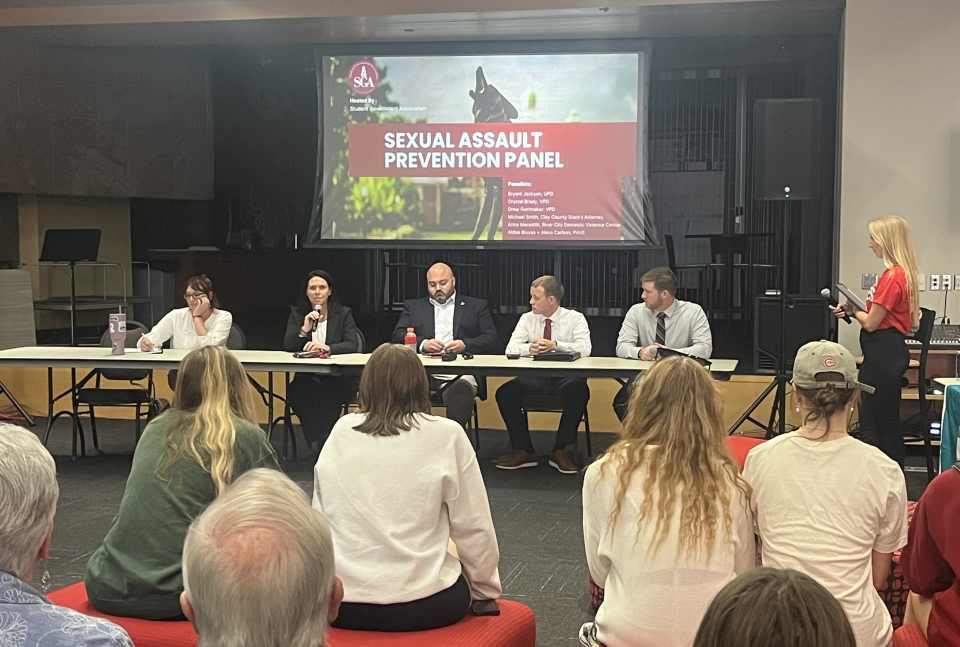After 5th sexual assault at USD, students and law enforcement frank about prevention
Editor's note: This story features descriptions of sexual assault. If you or someone you know has been sexually assaulted, please reach out to either the Compass Center (605)339-0116, the Children's Inn (605)338-4880 or the Sioux Falls Police Department (605)367-7212. Sexual assault exams are available at hospitals in Sioux Falls as well as The Link downtown.
VERMILLION — Four days after a fifth sexual assault occurred at the University of South Dakota in Vermillion since the fall semester started, a panel of law enforcement and survivor advocates held a frank discussion with students about what each of the panelists are doing, and what the campus community should be doing, to prevent sexual assault and stomp out rape culture.
This fifth sexual assault occurred at about 5:45 a.m. Sept. 24 north of USD’s parking lot No. 5, which is near the intersection of Pine and Cherry Streets. In this case, the victim did not know the suspect, who was described as an approximately 6-foot tall male, wearing a hoodie and pants.
Vermillion Police Department Chief Crystal Brady said the VPD is investigating this incident and the victim was not a student. VPD said the suspect is unknown at this time.

News of the fifth sexual assault followed four others since classes began Aug. 21. Each of those incidents were perpetrated by acquaintances of the victims and were reported to the University Police Department. Details include:
The first occurred Aug. 25 at a fraternity in Vermillion, of which there are seven. The incident was reported to the campus community in a warning on Aug. 29.
The second occurred Sept. 3 in a USD residence hall on the north side of campus and was reported to the campus community in a warning Sept. 8.
The third occurred Sept. 9 in a USD residence hall on the north side of campus and was reported to the campus community in a warning Sept. 10.
The fourth occurred Sept. 17 in a USD residence hall on the north side of campus and was reported to the campus community in a warning Sept. 18.
VPD has active investigations for all of the September incidents, Brady said. No arrests have been made in those three cases, she said earlier.
More: USD has had an average of 1 sexual assault every 7 days since school started: What we know
During the panel discussion, students had questions about what they should do if they are sexually assaulted, what they can do to prevent sexual assault, and they asked for details on each of the cases.
'Giving that survivor back their voice and choice’
Each of the panelists spoke about their work in trauma-informed care and their victim-centered approaches to these crimes. The speakers included Brady; Cassie Nagel, executive director of the River City Domestic Violence Center in Yankton; Bryant Jackson, chief of the University Police Department; Drew Gortmaker, a VPD officer; and Michael Smith, Clay County State’s Attorney.
“Giving that survivor back their voice and choice is of the utmost importance,” Nagel said. “The route to justice that that victim or survivor takes really has to be up to them.”

Smith said his office makes decisions about charges “hand-in-hand” with victims and realizes that the criminal justice system isn’t always the right approach for some survivors at that time.
“We’re never going to push that along in an inappropriate way, even if we have a case that we believe is viable and provable,” Smith said.
One student asked which resources someone should go to if they’re sexually assaulted, and Nagel responded they should go to whatever feels most comfortable for them at the time and whoever responds will recommend all the resources available. Brady added survivors can go to whatever they’re comfortable with, and whatever is the most primary need at the moment.
“If you are in danger, call law enforcement immediately,” Brady said. “If you need information and feel like your barrier (is) ‘I don’t want to call police right away,’ call an advocate and just get some information right away.
“I’m biased for law enforcement because I want to protect evidence right away, because evidence is really important and it’s only there for a certain period of time, and I want to have a good case, to help you follow through with a good case, but that might not be what you need,” Brady added. “Maybe you just need mental health resources and some medical help to get through what you need.”
Protection and accountability on campus
USD multicultural affairs coordinator Marcus Destin asked the panel how the campus community can establish a culture of accountability and protection together.
To this question, Brady responded with an analogy about a $100 bill.
“I don’t want to ever come across as victim blaming in any way, but I liken it to someone who has a $100 bill. I would advise that person not to leave the $100 bill laying on the front seat of their car with the windows open and their car unlocked,” she said. “Once that $100 bill is stolen, I might not get it back for them and I can never take that back.”
Brady emphasized it’s never a victim's or survivor’s fault when they are sexually assaulted. “It is the perpetrator’s fault, 100%,” she said, emphasizing things students can do to protect themselves and each other.
She suggested to students that they should stay together when they go out to parties or bars; not drink in excess or accept drinks from people you don’t know or trust; spend time with people you respect and trust; have a plan to leave a situation you’re uncomfortable with; be a good bystander and intervene to get someone out of an unsafe situation.
What is consent?
Most of all, Brady said, people should not push someone else into doing something they’re not comfortable with or consenting to.
“The majority of our sexual assaults are around consent, and either party saying that they did not give consent,” Brady said. “The law has really not caught up with those types of cases.”
A legal definition of consent was not established in South Dakota until last legislative session and went into effect this summer, defining in state law what consent is and that sex without consent is indeed rape, previous Argus Leader reporting shows.
More: 'This was sexual assault': Lack of consent law leaves survivors without justice in South Dakota
Consent is enthusiastic, clearly and freely communicated, ongoing, and can be withdrawn at any point, according to the Rape, Abuse and Incest National Network. RAINN also clarifies consent can’t be given by anyone underage, intoxicated, incapacitated by drugs or alcohol, asleep or unconscious.
Brady told the Argus Leader that when dealing with sexual assault cases, investigators and law enforcement officers often have to ask questions about if “no” was indicated; if there were threats, coercion or force; or, if drugs or alcohol were a factor.
In some cases, “it just doesn’t fit any of the criteria that the law requires, and it just becomes more of a consent issue,” Brady said. “We have to determine, ‘Would the suspect have known that they weren’t getting consent?’ It’s so vague. The law isn’t there yet where it defines that.”
The newest definitions added to law, however, do offer an additional legal mechanism for survivors of sexual assault who freeze and are unable to fight back during their attack. Sex without consent became a Class 3 felony, punishable by up to 15 years in prison and a maximum fine of $30,000 in July.
Not just one solution to sexual assault prevention
In addition to bystander intervention and sexual assault prevention strategies students and community members can take, UPD is also working on this issue “around the clock,” Jackson said, noting there is no single solution to this problem.
“To be fully transparent, our team is working 12-hour shifts,” Jackson said.
He noted that since the majority of sexual assaults on or near campus have been “acquaintance-based,” it is harder to prevent those incidents “from the law enforcement perspective.”
A student asked Jackson about what USD can do for students who’ve been sexually assaulted and whose case can’t be prosecuted. Jackson said the Title IX process is somewhat similar to the criminal justice system and there can be informal resolutions and supportive measures put in place.
For example, USD can change class schedules, rooms or dorms, help with no-contact or protection orders, and more, Jackson said.
“We want victims to feel empowered to come forward and get those resources, whether it’s (through) the criminal process, the Title IX process or (other) resources.”
'You need to fix the culture that happens in those houses'
One student who said she was involved in Greek life on campus asked specifically about the Aug. 25 incident at a fraternity and why the warning sent to the campus community did not specifically identify which fraternity the sexual assault occurred at.
“I have a position in a sorority where I’m constantly hanging out with these frats, interacting with these frats,” she said. “How do I know that these girls are actually safe going into the house?”
Brady responded she gets a lot of questions about at which frat the incident occurred.
“It feels like every year, it’s a different frat,” she said. “For whatever reason, everybody has a reason to believe it was each one of those houses, because there’s probably been a sexual assault that has happened at each one of those houses each year. The problem wasn’t what house it was for this individual attack, the problem is Greek life in general.”
Brady said the “culture” is the problem with frat houses and said the culture needs to be addressed at the houses, not one particular incident. She also explained the person who made the report about the Aug. 25 incident to USD wasn’t the victim, and that the victim themselves did not want a police report made.
“You cannot have the police department spread all over campus (information about) where your incident happened, and all of that private information given out to everybody on campus and the press,” Brady said. “That’s why we didn’t answer that question. That’s not the real question that needs to be answered anyway. You need to fix the culture that happens in those houses, and that starts with you guys.”
Correction: A previous version of this story misstated that South Dakota did not have a law defining consent. That law was estaiblished earlier this year and went into effect this summer. The story has been updated to reflect this change.
If you are a survivor of one of the aforementioned cases and you would like to speak out to give your story a voice as we continue to raise awareness about sexual assault on college campuses, contact education reporter Morgan Matzen at MMatzen@argusleader.com.
This article originally appeared on Sioux Falls Argus Leader: University of South Dakota reports fifth sexual assault on campus

